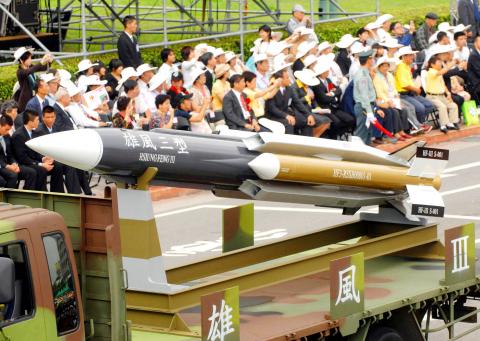The Taiwanese anti-ship missile that was accidentally launched last week, hitting a Taiwanese fishing boat and killing its captain, is a powerful weapon in which foreign nations have expressed interest since the Paris Air Show last year, a source in the Ministry of National Defense told reporters.
The source said the Hsiung Feng III is the mainstay of the Taiwanese military’s ship-killing arsenal, and one of the few supersonic anti-ship missiles in the world to be independently designed and produced, making it a desirable item in the global arms market.
However, the ministry does not foresee the possibility of selling the Hsiung Feng III to other nations, as the missile has just entered mass production and is a restricted weapon whose export is constrained by factors outside of the ministry’s control, the source said.

Photo: AFP
Researched and developed by the Chungshan Institute of Science and Technology, the Hsiung Feng III has a maximum effective range of between 130km and 150km, while a new extended-range model has a range of more than 300km.
When the institute became a legal entity under the control of the Executive Yuan, it was directed to showcase Taiwan’s defense technology to the international community, and has since then actively participated in international aeronautic exhibitions, the source said.
Several potential buyers made inquiries through intermediaries about the weapon’s technical specifications following the deadly mishap, the source said.
Because it is an aircraft-carrier-killing weapon, the nation’s allies have repeatedly expressed interest in it during joint military events, the source said.
Even at the research and development stage of the missile, representatives from foreign government agencies and arms makers contacted the government and the institute about Taipei’s willingness to sell the weapon or technology related to it, the source said.
The Taiwanese military’s purchase program for the Hsiung Feng III ran from 2007 to last year, and had a total budget of NT$11.89 billion (US$368.3 million), including deployment costs.
The commonly cited price of NT$100 million for 120 missiles is a misconception, the source said, because it fails to take into account the added cost of refurbishing facilities and one-year’s supply of spare parts.

A Ministry of Foreign Affairs official yesterday said that a delegation that visited China for an APEC meeting did not receive any kind of treatment that downgraded Taiwan’s sovereignty. Department of International Organizations Director-General Jonathan Sun (孫儉元) said that he and a group of ministry officials visited Shenzhen, China, to attend the APEC Informal Senior Officials’ Meeting last month. The trip went “smoothly and safely” for all Taiwanese delegates, as the Chinese side arranged the trip in accordance with long-standing practices, Sun said at the ministry’s weekly briefing. The Taiwanese group did not encounter any political suppression, he said. Sun made the remarks when

PREPAREDNESS: Given the difficulty of importing ammunition during wartime, the Ministry of National Defense said it would prioritize ‘coproduction’ partnerships A newly formed unit of the Marine Corps tasked with land-based security operations has recently replaced its aging, domestically produced rifles with more advanced, US-made M4A1 rifles, a source said yesterday. The unnamed source familiar with the matter said the First Security Battalion of the Marine Corps’ Air Defense and Base Guard Group has replaced its older T65K2 rifles, which have been in service since the late 1980s, with the newly received M4A1s. The source did not say exactly when the upgrade took place or how many M4A1s were issued to the battalion. The confirmation came after Chinese-language media reported

The Taiwanese passport ranked 33rd in a global listing of passports by convenience this month, rising three places from last month’s ranking, but matching its position in January last year. The Henley Passport Index, an international ranking of passports by the number of designations its holder can travel to without a visa, showed that the Taiwan passport enables holders to travel to 139 countries and territories without a visa. Singapore’s passport was ranked the most powerful with visa-free access to 192 destinations out of 227, according to the index published on Tuesday by UK-based migration investment consultancy firm Henley and Partners. Japan’s and

BROAD AGREEMENT: The two are nearing a trade deal to reduce Taiwan’s tariff to 15% and a commitment for TSMC to build five more fabs, a ‘New York Times’ report said Taiwan and the US have reached a broad consensus on a trade deal, the Executive Yuan’s Office of Trade Negotiations said yesterday, after a report said that Washington is set to reduce Taiwan’s tariff rate to 15 percent. The New York Times on Monday reported that the two nations are nearing a trade deal to reduce Taiwan’s tariff rate to 15 percent and commit Taiwan Semiconductor Manufacturing Co (TSMC, 台積電) to building at least five more facilities in the US. “The agreement, which has been under negotiation for months, is being legally scrubbed and could be announced this month,” the paper said,